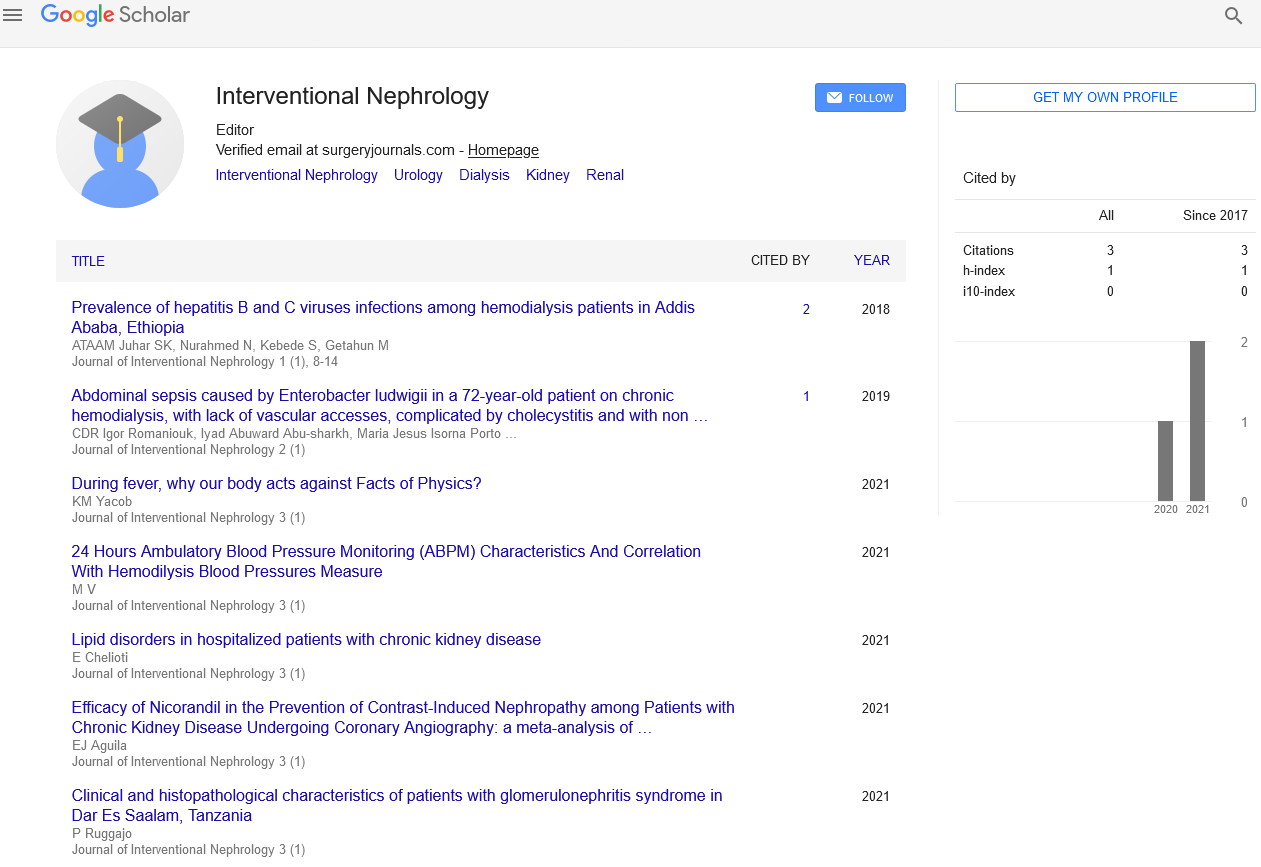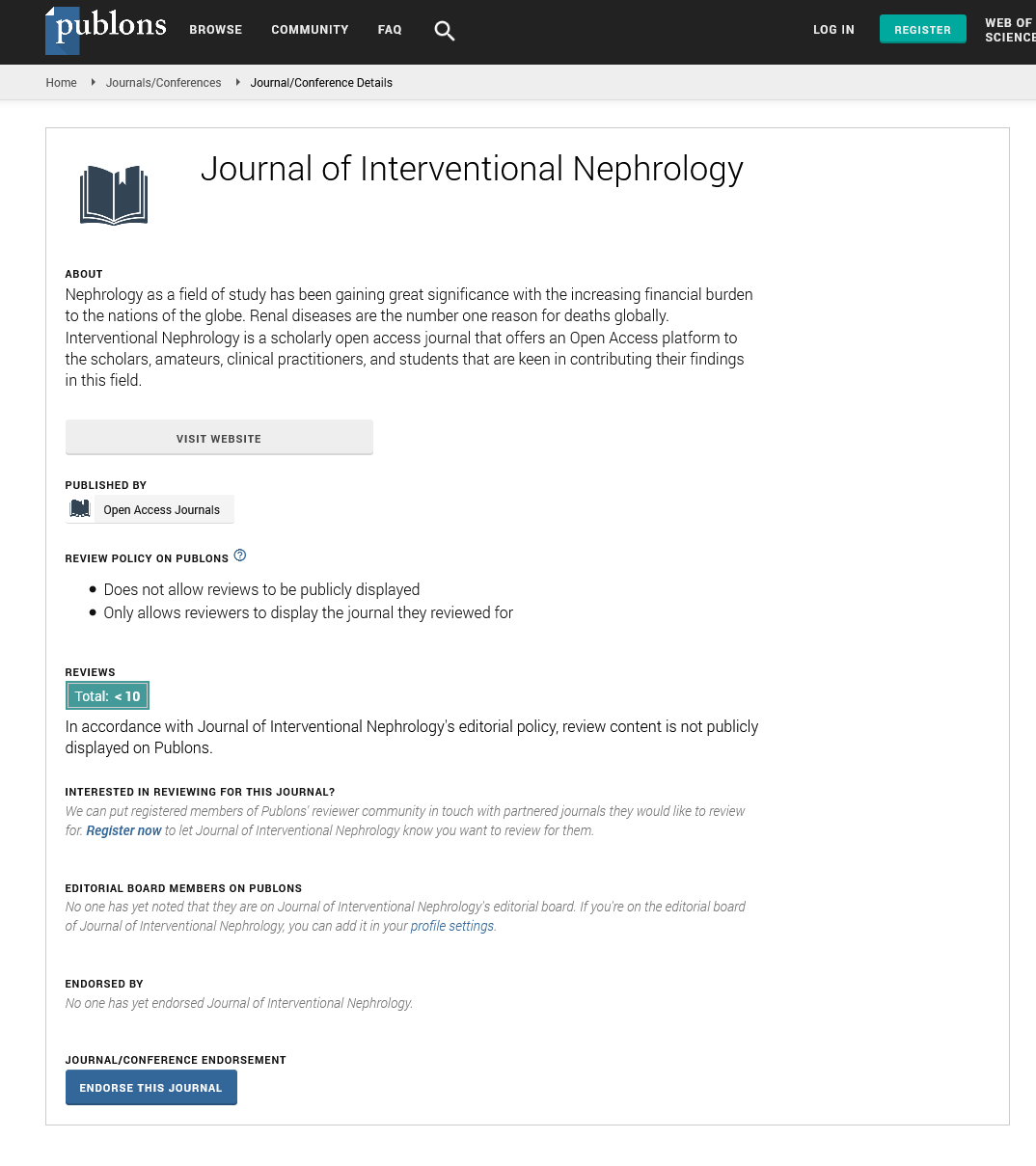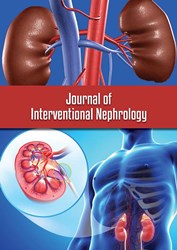Editorial - Journal of Interventional Nephrology (2022) Volume 5, Issue 6
Prenatal renal disease
George Davis*
Department of Medicine, GRP College of Medicine, United Kingdom
Department of Medicine, GRP College of Medicine, United Kingdom
E-mail: George39@gmail.com
Received: 01-Dec-2022, Manuscript No. oain-22-83968; Editor assigned: 03-Dec-2022, PreQC No. oain-22- 83968; Reviewed: 17-Dec-2022, QC No. oain-22-83968; Revised: 19-Dec- 2022, Manuscript No. oain-22-83968 (R); Published: 26-Dec-2022; DOI: 10.47532/oain.2022.5(6).79-80
Abstract
In high income countries, 3% of pregnant women have renal illness. Pre-eclampsia, foetal growth limitation, and loss of maternal renal function are among the pregnancy hazards linked with renal illness. Planning ahead is crucial for both optimising maternal management and ensuring that the woman is aware of all the hazards. A suitable center’s interdisciplinary management and good prenatal care will help to reduce risks for both mother and child.
Introduction
Pregnancy-related renal impairment can result from a variety of medical problems or primary renal disease. Recurrent urinary tract infections, reflux nephropathy, lupus nephritis, diabetic nephropathy, and hypertensive renal disease are the most typical renal diseases found in pregnancy. There are a few general issues that need to be addressed while managing pregnant women with renal disease, in addition to the specific therapy of the underlying ailment [1].
While CKD stages 3-5 only afflict about 0.5% of women of reproductive age, stages 1 and 2 are rather frequent, affecting about 3% of women. However, individuals with mild disease can typically be reassured that they will most likely have an easy pregnancy with little to no influence on long-term kidney function. All women with renal disease are likely to be categorised as high risk of unfavourable pregnancy outcomes. Contrarily, pregnancy can expedite an irreversible loss in kidney function in women who already have considerable renal impairment and is associated with a high risk of negative pregnancy outcomes [2,3].
Methods
Pregnancy causes considerable physiological changes in the kidneys, which play a critical role in coordinating the systemic alterations in a pregnant woman’s hemodynamic. Pregnancy increases blood flow to the kidneys by 70%, and in 80% of women, the kidneys’ overall size increases by up to 1 cm physically. The physiological hydronephrosis, increased renal blood flow, and fluid retention are the causes of this. The ureters are compressed mechanically [4].
The goal of pre-pregnancy counselling should be to provide each woman with a clear image of her unique pregnancy outcome, for both herself and her unborn child. This will cover the potential effects of renal function on pregnancy as well as the potential effects of renal illness on pregnancy. The hazards associated with most renal disorders are similar; however they differ in terms of absolute risk. Preeclampsia, preterm delivery, foetal development limitation, and NICU hospitalisation are some of these hazards [5,6].
The origin, severity, and any extra pregnancy-specific issues, such as preeclampsia, which frequently complicates pregnancies in women with renal illness, will all have a significant impact on the pregnancy outcomes for women who have pre-existing renal disease. Along with pre-pregnancy blood pressure and urine protein, pre-pregnancy creatinine is a helpful indication for predicting outcomes. While preterm birth, growth restriction, and pre-eclampsia rates are significant for women with severe impairment (Creatinine >180) or who are on dialysis, it is generally safe to reassure women with only mild impairment (creatinine 125) that pregnancy outcomes are positive and unlikely to result in any permanent deterioration in kidney function. 50% of women who have severe renal impairment will lose more than 25% of their current renal function. A lifelong decline in renal function during pregnancy is also more likely in women who begin their pregnancies with hypertension and/or proteinuria [7], [8], [9].
Conclusion
Young women are prone to renal disease, which can be brought on by a number of different underlying diseases. The best results come from meticulous MDT planning and prepregnancy counselling to optimise care before pregnancy [10].
Acknowledgement
None
Conflict of Interest
None
References
- Di Mascio D, Khalil A, Saccone G. Outcome of Coronavirus spectrum infections during pregnancy: a systematic review and meta-analysis. Am J Obstet Gynecol. 2, 107 (2020).
- Littauer EQ, Esser ES, Antao OQ. H1N1 influenza virus infection results in adverse pregnancy outcomes by disrupting tissue-specific hormonal regulation. Plos Pathog.13, 6757 (2017).
- Zhang JP, Wang YH, Chen LN. Clinical analysis of pregnancy in second and third trimester complicatd severe acute respiratory syndrome. Zhonghua Fu Chan Ke Za Zhi. 38, 516-520 (2003).
- Levy A, Yagil Y, Bursztyn M. ACE2 expression and activity are enhanced during pregnancy. Am J Physiol Regul Integr Comp Physiol. 295, 1953-1961(2008).
- Wu Z, McGoogan JM. Characteristics of and important lessons from the coronavirus disease 2019 (COVID-19) outbreak in China: summary of a report of 72314 cases from the Chinese center for disease Control and prevention. JAMA. 2020.
- Mullins E, Evans D, Viner RM. Coronavirus in pregnancy and delivery: rapid review. Ultrasound Obstet Gynecol. 55, 586-592 (2020).
- Garg S, Kim L, Whitaker M. Hospitalization rates and characteristics of patients hospitalized with laboratory-confirmed coronavirus disease 2019 - COVID-NET, 14 states, March 1-30, 2020. MMWR Morb Mortal Wkly Rep. 69, 458-464 (2020).
- Dashraath P, Wong JLJ, Lim MXK. Coronavirus disease 2019 (COVID-19) pandemic and pregnancy. Am J Obstet Gynecol. 222, 521-531(2020).
- Schwartz DA. An analysis of 38 pregnant women with COVID-19, their newborn infants, and maternal-fetal transmission of SARS-CoV-2: maternal coronavirus infections and pregnancy outcomes. Arch Pathol Lab Med. 2020.
- Yang H, Sun G, Tang F. Clinical features and outcomes of pregnant women suspected of coronavirus disease 2019. J Infect. 81, 40-44 (2020).


